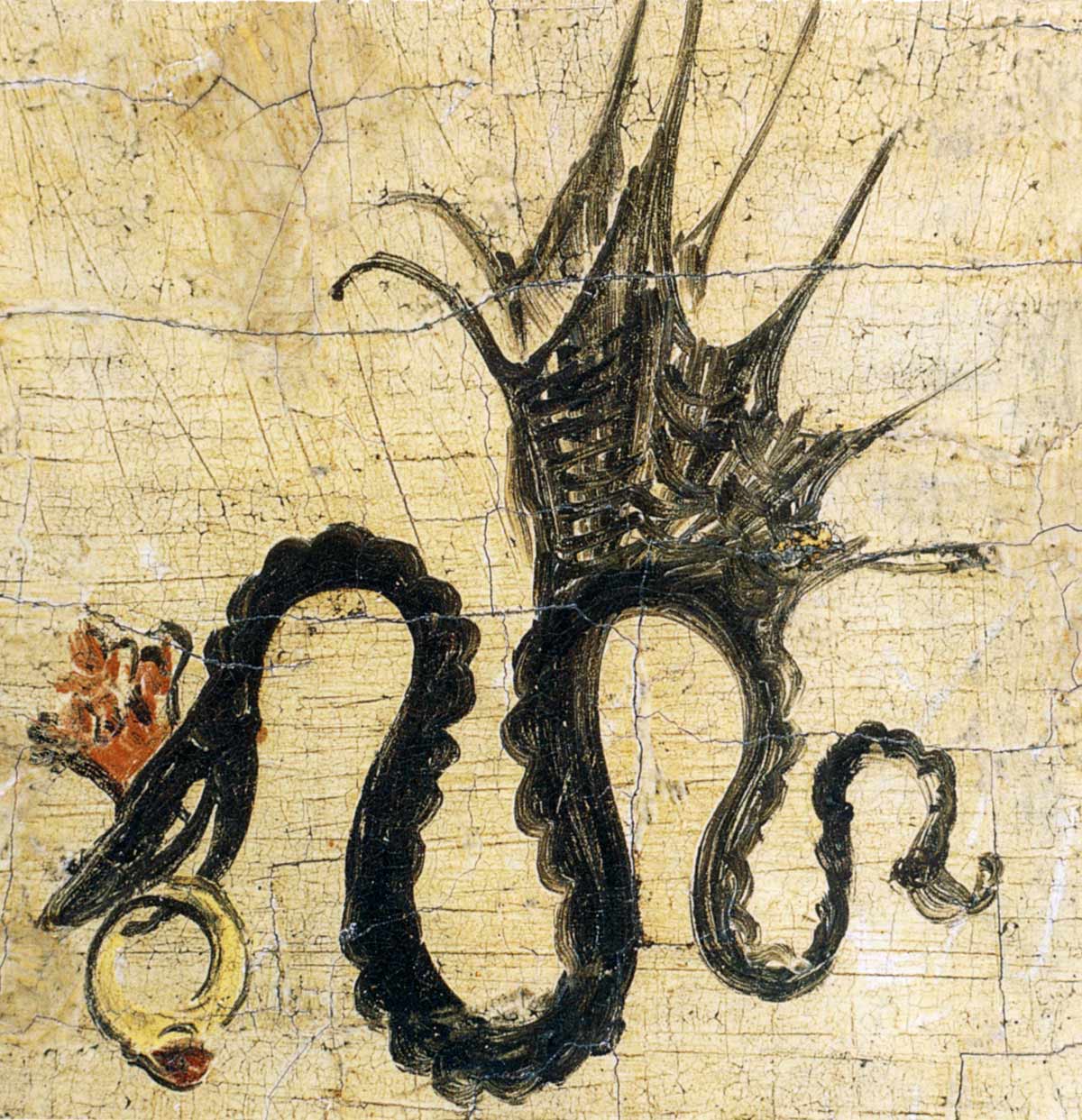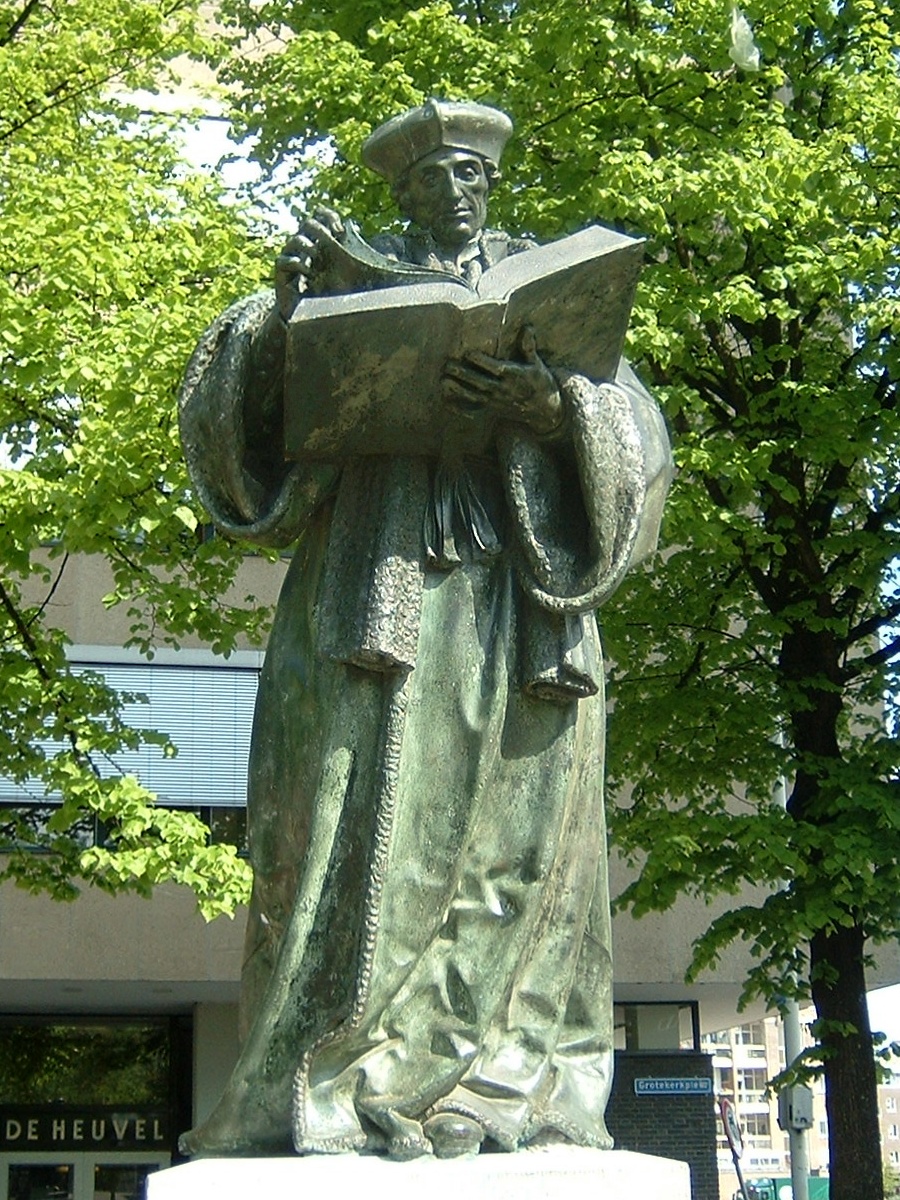|
Philipp Melanchthon
Philip Melanchthon (born Philipp Schwartzerdt; 16 February 1497 – 19 April 1560) was a German Lutheran reformer, collaborator with Martin Luther, the first systematic theologian of the Protestant Reformation, an intellectual leader of the Lutheran Reformation, and influential designer of educational systems. He stands next to Luther and John Calvin as a reformer, theologian, and shaper of Protestantism. Early life and education He was born Philipp Schwartzerdt on 16 February 1497 at Bretten, where his father Georg Schwarzerdt (1459–1508) was armorer to Philip, Count Palatine of the Rhine. His mother was Barbara Reuter (1476/77-1529). Bretten was burned in 1689 by French troops during the War of the Palatinate Succession. The town's Melanchthonhaus was built on the site of his place of birth in 1897. In 1507 he was sent to the Latin school at Pforzheim, where the rector, Georg Simler of Wimpfen, introduced him to the Latin and Greek poets and to Aristotle. He was i ... [...More Info...] [...Related Items...] OR: [Wikipedia] [Google] [Baidu] |
Lucas Cranach The Elder
Lucas Cranach the Elder ( ; – 16 October 1553) was a German Renaissance painter and printmaker in woodcut and engraving. He was court painter to the Electors of Saxony for most of his career, and is known for his portraits, both of German princes and those of the leaders of the Protestant Reformation, whose cause he embraced with enthusiasm. He was a close friend of Martin Luther, and Portrait of Martin Luther (Lucas Cranach the Elder), eleven portraits of that reformer by him survive. Cranach also painted religious subjects, first in the Catholic tradition, and later trying to find new ways of conveying Lutheran religious concerns in art. He continued throughout his career to paint nude subjects drawn from mythology and religion. Cranach had a large workshop and many of his works exist in different versions; his son Lucas Cranach the Younger and others continued to create versions of his father's works for decades after his death. He has been considered the most successfu ... [...More Info...] [...Related Items...] OR: [Wikipedia] [Google] [Baidu] |
Philip, Count Palatine Of The Rhine
Philip the Upright () (14 July 1448 – 28 February 1508) was an Elector Palatine of the Rhine from the house of Wittelsbach from 1476 to 1508. Biography He was the only son of Louis IV, Count Palatine of the Rhine and his wife Margaret of Savoy. At the age of one year Philip fell under the guardianship of his uncle Frederick, who later adopted him. In 1474, he married Margaret of Bavaria-Landshut, the daughter of Louis IX, Duke of Bavaria and by virtue of the marriage received the Upper Palatinate. After the death of his adoptive father in 1476, he became the Elector. In 1499 he inherited the possessions of the branches of Palatinate-Mosbach and Palatinate-Neumarkt. Philip lost the Landshut War of Succession in 1504 to Albert IV, Duke of Bavaria. In 1481 Philip invited Johann von Dalberg into the Ruprecht Karl University of Heidelberg. Family and children Philip married Margaret of Bavaria (7 November 1456 – 25 January 1501) on 21 February 1474. They had the ... [...More Info...] [...Related Items...] OR: [Wikipedia] [Google] [Baidu] |
Erasmus
Desiderius Erasmus Roterodamus ( ; ; 28 October c. 1466 – 12 July 1536), commonly known in English as Erasmus of Rotterdam or simply Erasmus, was a Dutch Christian humanist, Catholic priest and Catholic theology, theologian, educationalist, Menippean satire, satirist, and philosopher. Through his Works of Erasmus, works, he is considered one of the most influential thinkers of the Northern Renaissance and one of the major figures of Dutch and Western culture. Erasmus was an important figure in classical scholarship who wrote in a spontaneous, copious and natural Latin style. As a Catholic priest developing Philology, humanist techniques for working on texts, he prepared pioneering new Vulgate, Latin and Biblical Greek, Greek scholarly editions of the Novum Instrumentum omne, New Testament and of the Church Fathers, with annotations and commentary that were immediately and vitally influential in both the Protestant Reformation and the Catholic Reformation. He also wrote ''De ... [...More Info...] [...Related Items...] OR: [Wikipedia] [Google] [Baidu] |
Johannes Stöffler
Johannes Stöffler (also ''Stöfler, Stoffler, Stoeffler''; 10 December 1452 – 16 February 1531) was a German mathematician, astronomer, astrologer, priest, maker of astronomical instruments and professor at the University of Tübingen. Life Johannes Stöffler was born on 10 December 1452 in Justingen (now part of Schelklingen) on the Swabian Alb. Having received his basic education at the Blaubeuren monastery school, he registered at the newly founded University of Ingolstadt on 21 April 1472, where he was consequently promoted Baccalaureus in September 1473 and Magister in January 1476. After finishing his studies he obtained the parish of Justingen where he, besides his clerical obligations, concerned himself with astronomy, astrology and the making of astronomical instruments, clocks and celestial globes. He conducted a lively correspondence with leading humanists - for example, Johannes Reuchlin, for whom he made an equatorium and wrote horoscopes. In 1499, Stö ... [...More Info...] [...Related Items...] OR: [Wikipedia] [Google] [Baidu] |
Astrology
Astrology is a range of Divination, divinatory practices, recognized as pseudoscientific since the 18th century, that propose that information about human affairs and terrestrial events may be discerned by studying the apparent positions of Celestial objects in astrology, celestial objects. Different cultures have employed forms of astrology since at least the 2nd millennium BCE, these practices having originated in Calendrical calculation, calendrical systems used to predict seasonal shifts and to interpret celestial cycles as signs of divine communications. Most, if not all, cultures have attached importance to what they observed in the sky, and some—such as the Hindu astrology, Hindus, Chinese astrology, Chinese, and the Maya civilization, Maya—developed elaborate systems for predicting terrestrial events from celestial observations. Western astrology, one of the oldest astrological systems still in use, can trace its roots to 19th–17th century BCE Mesopotamia, fr ... [...More Info...] [...Related Items...] OR: [Wikipedia] [Google] [Baidu] |
Astronomy
Astronomy is a natural science that studies celestial objects and the phenomena that occur in the cosmos. It uses mathematics, physics, and chemistry in order to explain their origin and their overall evolution. Objects of interest include planets, natural satellite, moons, stars, nebulae, galaxy, galaxies, meteoroids, asteroids, and comets. Relevant phenomena include supernova explosions, gamma ray bursts, quasars, blazars, pulsars, and cosmic microwave background radiation. More generally, astronomy studies everything that originates beyond atmosphere of Earth, Earth's atmosphere. Cosmology is a branch of astronomy that studies the universe as a whole. Astronomy is one of the oldest natural sciences. The early civilizations in recorded history made methodical observations of the night sky. These include the Egyptian astronomy, Egyptians, Babylonian astronomy, Babylonians, Greek astronomy, Greeks, Indian astronomy, Indians, Chinese astronomy, Chinese, Maya civilization, M ... [...More Info...] [...Related Items...] OR: [Wikipedia] [Google] [Baidu] |
Rhetoric
Rhetoric is the art of persuasion. It is one of the three ancient arts of discourse ( trivium) along with grammar and logic/ dialectic. As an academic discipline within the humanities, rhetoric aims to study the techniques that speakers or writers use to inform, persuade, and motivate their audiences. Rhetoric also provides heuristics for understanding, discovering, and developing arguments for particular situations. Aristotle defined rhetoric as "the faculty of observing in any given case the available means of persuasion", and since mastery of the art was necessary for victory in a case at law, for passage of proposals in the assembly, or for fame as a speaker in civic ceremonies, he called it "a combination of the science of logic and of the ethical branch of politics". Aristotle also identified three persuasive audience appeals: logos, pathos, and ethos. The five canons of rhetoric, or phases of developing a persuasive speech, were first codified in classical Rome: i ... [...More Info...] [...Related Items...] OR: [Wikipedia] [Google] [Baidu] |
Philosophy
Philosophy ('love of wisdom' in Ancient Greek) is a systematic study of general and fundamental questions concerning topics like existence, reason, knowledge, Value (ethics and social sciences), value, mind, and language. It is a rational and critical inquiry that reflects on its methods and assumptions. Historically, many of the individual sciences, such as physics and psychology, formed part of philosophy. However, they are considered separate academic disciplines in the modern sense of the term. Influential traditions in the history of philosophy include Western philosophy, Western, Islamic philosophy, Arabic–Persian, Indian philosophy, Indian, and Chinese philosophy. Western philosophy originated in Ancient Greece and covers a wide area of philosophical subfields. A central topic in Arabic–Persian philosophy is the relation between reason and revelation. Indian philosophy combines the Spirituality, spiritual problem of how to reach Enlightenment in Buddhism, enlighten ... [...More Info...] [...Related Items...] OR: [Wikipedia] [Google] [Baidu] |
Johann Reuchlin
Johann Reuchlin (; 29 January 1455 – 30 June 1522), sometimes called Johannes, was a German Catholic humanist and a scholar of Greek and Hebrew, whose work also took him to modern-day Austria, Switzerland, Italy, and France. Most of Reuchlin's career centered on advancing German knowledge of Greek and Hebrew. Early life Johann Reuchlin was born at Pforzheim in the Black Forest in 1455, where his father was an official of the Dominican monastery. According to the fashion of the time, his name was graecized by his Italian friends into Capnion (Καπνίων), a nickname which Reuchlin used as a sort of transparent mask when he introduced himself as an interlocutor in the ''De Verbo Mirifico''. He remained fond of his home town; he constantly calls himself Phorcensis, and in the ''De Verbo'' he ascribes to Pforzheim his inclination towards literature. Here he began his Latin studies in the monastery school, and, though in 1470 he was for a short time at Freiburg, that university ... [...More Info...] [...Related Items...] OR: [Wikipedia] [Google] [Baidu] |
Aristotle
Aristotle (; 384–322 BC) was an Ancient Greek philosophy, Ancient Greek philosopher and polymath. His writings cover a broad range of subjects spanning the natural sciences, philosophy, linguistics, economics, politics, psychology, and the arts. As the founder of the Peripatetic school of philosophy in the Lyceum (classical), Lyceum in Athens, he began the wider Aristotelianism, Aristotelian tradition that followed, which set the groundwork for the development of modern science. Little is known about Aristotle's life. He was born in the city of Stagira (ancient city), Stagira in northern Greece during the Classical Greece, Classical period. His father, Nicomachus (father of Aristotle), Nicomachus, died when Aristotle was a child, and he was brought up by a guardian. At around eighteen years old, he joined Plato's Platonic Academy, Academy in Athens and remained there until the age of thirty seven (). Shortly after Plato died, Aristotle left Athens and, at the request ... [...More Info...] [...Related Items...] OR: [Wikipedia] [Google] [Baidu] |
Wimpfen
Bad Wimpfen () is a historic spa town in the Heilbronn (district), district of Heilbronn in the Baden-Württemberg region of southern Germany. It lies north of the city of Heilbronn, on the river Neckar. Geography Bad Wimpfen is located on the west bank of the River Neckar, around north of Heilbronn. The town is divided into two parts: the older ''Wimpfen im Tal'' (Lower Wimpfen/ literally Wimpfen in the valley) situated on the Neckar, and ''Wimpfen am Berg'' (Upper Wimpfen/ literally Wimpfen on the hill) containing the town centre. Besides the town itself, the village ''Hohenstadt'' also belongs to Bad Wimpfen. Neighbouring municipalities Neighbouring town and municipalities of Bad Wimpfen are (clockwise from the south): ''Heilbronn'', ''Bad Rappenau'', Offenau, ''Bad Friedrichshall'', Untereisesheim and ''Neckarsulm''. History First settlement by the Celts The first traces of settlement at Bad Wimpfen date from the Neolithic and the Bronze Age. An old trade road runn ... [...More Info...] [...Related Items...] OR: [Wikipedia] [Google] [Baidu] |








